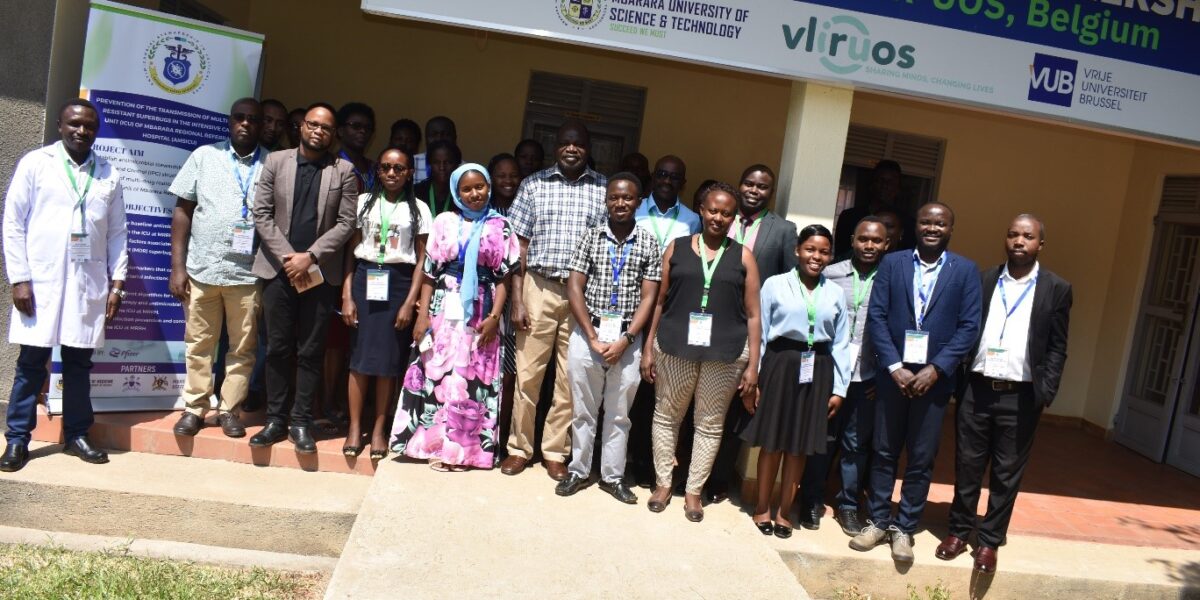MUST Faculty of Medicine Launches the AMSICU Project for Antimicrobial Stewardship and Infection Prevention and Control in the Mbarara Regional Referral Hospital (MRRH) Intensive Care Unit (ICU).
The project held its inception meeting on 17th July 2023 in the UCoBS Boardroom at MUST Town Campus. The project Co-PI, Dr. Jonans Tusiimire, who is also the Deputy Dean of the Faculty of Medicine (FoM), was the moderator.
In his welcome remarks, he welcomed all the participants who included: the project team members and representatives from MUST Grants Office (MGO), FoM and Mbarara Regional Referral Hospital. He thanked them for sparing their precious time to attend this inaugural meeting of the AMSICU project. He recognized other stakeholders that included: Dr. Thomas Obua and Dr. Rodney Tabaruka from the Ministry of Health and Pharmaceutical Society of Uganda (PSU).
In his opening remarks, the Dean Faculty of Medicine, Associate Professor Joseph Ngonzi, thanked the PI and his entire team for successfully winning the grant. He said that he was a cheerleader when the project was being written and urged the team to keep writing and applying for more grants which will contribute to the improvement of patient outcomes. He emphasized that secondary data should be made available to future researchers for other scholarly work. He officially launched the project.
Speaking on behalf of Directorate of Research and Graduate Training (DRGT), the Chairman DRGT Board, Associate Prof Joel Bazira, advised that with team building and multidisciplinary collaboration, it is always very possible to win research grants. He further said that sometimes big names can help you win grants but most times it is the concept and good ideas that win. He then urged the students on the team to take this as a mentorship session not just to present their work. He added that if one wants to be researcher, they have to always be writing. He said we should write to compete and not just to win; and we should just keep writing. He encouraged the PI and the team to apply for more grants such as the K-43 grants.
Mr. Wagubi Robert, the MRRH laboratory manager, also a project team member, spoke on behalf of the Director for MRRH. He was glad that this was the second Pfizer-funded project in the hospital and welcomes the project team to join MRRH in the fight against AMR. He reiterated the improved lab capacity at MRRH which are now internationally accredited/recognized. He noted some of challenges that maybe faced and these included; lack of complete records of previous patients, some participants may not be willing to provide information during data collection, and others don’t respond to invitations for CMEs. Lastly, he said the director and the entire hospital team are ready and passionate to work with the project team.
The Head of Department Anesthesia, Dr Stephen Ttendo is a Co-PI on the project. In his absence, he delegated Dr. Ephantius Mwangi, an SHO in Anesthesia, who was very grateful that of all the departments in MRRH, the ICU had been chosen as a beneficiary for this project. He said the project will help tackle most of the issues like bug resistance. With the evidence from the data that will be collected, empirical therapy will be implemented with evidence.
The remarks from MGO were made by Ms. Jaqueline Karuhanga. She said, ‘’The Grants Office is the one responsible for the funds. There are procedures to accessing and spending the funds and government policies should be adhered to.” She added their role as MGO is not to frustrate the process but rather it is to ensure that project funds are managed properly. In that way the researchers’ credibility is protected should they wish to apply for more funding in the future. She pledged to work with the team and provide any guidance that will be needed.
The Chief Guest, Dr Thomas Obua, the Registrar Pharmacy Board at the Ministry of Health and a Council Member of the Pharmaceutical Society of Uganda, urged the project team members to diligently and promptly disseminate the results of the study so that they help the country. He further said that this study will help answer most of the questions that have been unanswered due to lack of information and urged the team to bring more people on board from the MoH during stakeholder consultations to ensure alignment with national programs on AMS and IPC protocols.
Brief about AMSICU Project
The Pfizer funded AMSICU project seeks to promote antimicrobial stewardship in critical care by focusing on prevention of the transmission of multi-drug resistant superbugs in the Intensive Care Unit of Mbarara Regional Referral Hospital.
The project aims to develop an evidence-based AMS program and implementation of IPC in the ICU at MRRH. The project will also identify root causes for MDR superbugs and propose local solutions to circumvent this problem. A baseline antimicrobial susceptibility testing will inform the development of a treatment algorithm for empirical therapy and de-escalation of antibiotics for infected patients. In addition, predictive serum biomarkers for infections will be measured to guide in de-escalation of antibiotics for ICU patients. This will eventually reduce the irrational use of antibiotics and cost of therapy for patients. MDR superbugs require expensive drugs and a culture and sensitivity result, and some of these drugs may require monitoring which is expensive. The project will work together with existing hospital structures such as the MTC committee, AMS committee, and the Hospital laboratory and hospital ICU staff.
Project Team
The project PI is Dr. Daniel Chans Mwandah, a Clinical Pharmacologist and Clinical Pharmacist who is also a Lecturer in the Department of Pharmacology & Therapeutics, Faculty of Medicine, MUST. He has a 5-year expertise in antimicrobial therapeutics and clinical surveillance, and is a member of the Editorial Committee of the Pharmaceutical Society of Uganda. Dr Mwandah is also the PI of the DRGT-funded research and innovation project titled “Development of a Standardized Capsaicinoid-Based Topical Formulation for Chronic Pain Management in Patients with Arthritis and Cancer.”
The AMSICU project Co-PIs include: Dr. Jonans Tusiimire (Pharmacist), Dr. Stephen Ttendo (Anesthesiologist), Ms. Rose Dusabe (ICU Nurse), Dr. Miriam Josephine Nakiwala (Pharmacist), Mr. Robert Wagubi (Laboratory Scientist), Dr Stella Nanyonga (AMR Researcher), and Christine Tumuhimbise (ICU Nurse). Ms. Martha Namakula is a volunteer project assistant and one of the 5 students on the project. The others are: Nakiguli Ann Bossa, Namuyomba Mwajuma Kamoga, Kiyimba Kevin, and Babirye Stella.
Project Summary
Partners: Mbarara University of Science and Technology, Pharmaceutical Society of Uganda, Mbarara Regional Referral Hospital
Project Duration: One year
Grant Amount: 100,000 USD
Funding Organization: Pfizer
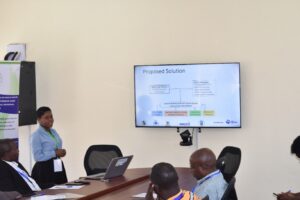
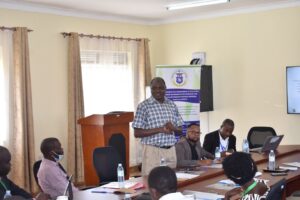
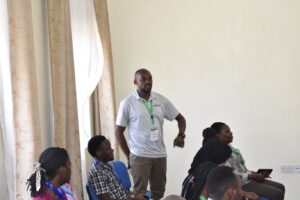
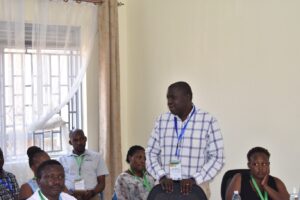
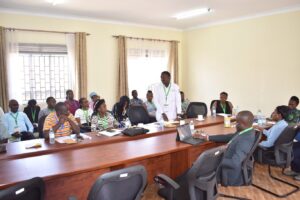
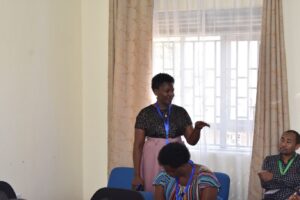
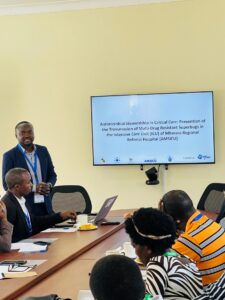
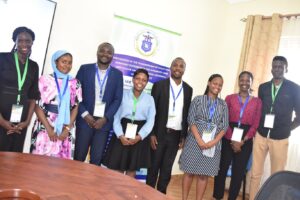
The AMSICU project team members with the students involved on the project. (L-R: Ms. Stella Babirye, Ms. Namuyomba Mwajuma Kamoga, Dr. Daniel Chans Mwandah, Dr. Miriam Josephine Nakiwala, Dr. Jonans Tusiimire (Co-PI), Ms. Martha Namakula Kulabako, Ms. Nakiguli Ann Bossa, and Mr. Kiyimba Kevin.)

